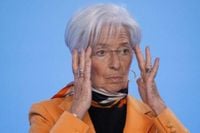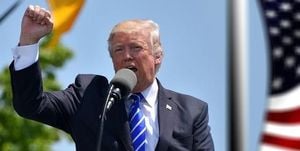The European Central Bank (ECB) is set to make a pivotal decision regarding the key interest rate for the Eurozone on Thursday, April 17, 2025. Experts predict that the ECB will lower the deposit rate by 0.25 percentage points, bringing it down to 2.25 percent. This anticipated reduction would mark the seventh interest rate cut since the ECB's shift in policy began in June 2024, during which the deposit rate has already dropped by 1.5 percentage points.
In March 2025, inflation rates in the Eurozone and Germany were reported at 2.2 percent, a figure that has contributed to the ECB's decision-making process. The Hamburg Commercial Bank estimates that approximately 70 percent of ECB Council members favor further easing of monetary policy, while about 15 percent advocate for a pause in rate cuts.
As the ECB prepares for its meeting, all eyes are on President Christine Lagarde, who will need to assess the implications of U.S. tariff policies, the strength of the Euro, and rising national debts. The recent tariff decisions by the U.S. have caused significant shifts in market dynamics, leading to increased prices and affecting both import and export landscapes.
Federal Reserve Chair Jerome Powell recently warned that U.S. tariffs could lead to higher inflation, reduced growth, and increased unemployment. Such economic pressures in the U.S. could have ripple effects on the Eurozone, complicating the ECB's task of maintaining price stability.
The ECB's neutral interest rate, which neither stimulates nor slows the economy, is estimated to be between 1.75 and 2.25 percent. This suggests that the current interest rates are still somewhat restrictive for economic growth. Analysts like Cyrus de la Rubia from the Hamburg Commercial Bank argue that the U.S. tariff policy actually provides the ECB with more leeway for further interest rate cuts.
Observers have adjusted their predictions, now expecting the ECB to cut interest rates by a total of one percentage point across its next four meetings by September 2025. ING Chief Economist Carsten Brzeski emphasized the urgency for the ECB to cut rates this week, noting that previous hopes for a pause have been dashed by recent economic developments.
Meanwhile, Deutsche Bank Chief Economist Mark Wall pointed out that the impact of higher tariffs and retaliatory measures may not necessarily lead to increased inflation in Europe immediately. Factors such as a stronger Euro, lower oil prices, and shifts in trade flows could counteract inflationary pressures.
For savers and borrowers, the implications of the ECB's interest rate decisions are complex. A reduction in rates could widen the gap between European and U.S. interest rates, where the key rate currently sits between 4.25 and 4.5 percent. This disparity could influence the demand for U.S. dollars, potentially affecting currency markets.
Jasmin Ehlert, Chief Analyst at Raisin, noted that while multi-year fixed deposit rates are expected to remain stable, rates for overnight and short-term fixed deposits are likely to decrease. The competition among banks for customer deposits is intensifying, leading to adjustments in the interest landscape.
In the construction financing sector, interest rates have shown extreme volatility in recent weeks, largely due to market reactions to changes in German fiscal policy. The yield on 10-year German government bonds surged initially but has since stabilized, impacting construction financing rates that typically align with these longer-term yields.
As of April 14, 2025, the representative interest rate for a 10-year construction loan from Dr. Klein was reported at 3.22 percent. Florian Pfaffinger, an analyst, indicated that while the markets are regaining stability, the overall environment remains uncertain, with construction interest rates expected to fluctuate within a predicted range of 3.25 to 3.5 percent in the coming months.
Despite the prevailing concerns about inflation, recent data shows that inflation rates in Germany and the Eurozone are approaching the ECB's target of 2 percent. This development suggests that inflationary trends due to U.S. tariff policies are not currently dominating the economic landscape.
Looking forward, Pfaffinger anticipates a small interest rate reduction at the ECB's upcoming meeting, potentially signaling a cautious approach as the central bank assesses the broader economic implications of ongoing geopolitical tensions.
In the context of the coalition agreement recently unveiled by the German government, which includes initiatives aimed at boosting housing construction and reducing bureaucracy, there are mixed feelings about the potential for real estate buyers. While the agreement proposes measures to support families in acquiring homes and easing tax burdens for renovations, critics argue that more concrete steps are needed to alleviate the financial burdens associated with property purchases.
Overall, the ECB's decisions in the coming weeks will be critical in shaping the economic landscape across Europe. With various factors at play, including international trade dynamics and domestic fiscal policies, the central bank's actions will be closely monitored by investors, borrowers, and policymakers alike.







